Pipeline Q&As
Hear directly from Reds prospects and baseball operations representatives throughout the season.
Q&A – Joe Katuska
Previously, you’ve mentioned guys like ninth-rounder Kien Vu as a pick with "tremendous value." Are there any other selections from this class you feel are in the same boat?
Yeah, I think we got some value throughout the draft there. We had different ways of getting it. Mason Neville, our fourth rounder, was a player that we [originally] drafted out of high school. We’ve known him for a long time and have seen good progression from him. This is a kid who has tools, has physical ability and led the country in home runs at Oregon this year. We were surprised when he showed up in the fourth round. We think he's a real value pick. Then leaning into a little bit of the risk in the sixth and seventh round with [Braden] Osbolt and [Justin] Henschel. Those are two guys who we think are talented. Unfortunately, they both hit speed bumps when they had to have Tommy John after their fourth start or so. Our guys did a really good job of being on them early where we were able to scout them when they were still healthy and we think their talent fits significantly in front of the sixth or seventh round where we were able to get those guys.
When drafting, how much are you identifying and considering the needs of the future?
Our biggest focus as a staff is always the best player available. The holes in the system or at the big league level aren't really something we're concerned about. We just saw that with trading Sammy Stafura to the Pirates for Ke’Bryan Hayes. We’re getting talented players into the system; they can then get deployed in several different ways. [That can be] impacting the big league team themselves or if it's because they're a talented player and the 29 other organizations want them, and we can turn that into big league value. The key is not trying to focus on organizational needs or gaps anywhere but just trying to identify the best players and giving our staff the opportunity to get as many of those guys into the system as possible.
How do you and the scouting staff approach the pressure that comes with taking someone in the first round?
It's about listening to every person in the room and leaning on the work that we've done through the whole process. We spent a lot of time talking about that first pick, especially last year when we were picking at two. A lot of my time scouting throughout the spring was scouting that crop of players that we had identified that was going to be in the mix there. The guys probably get tired of talking about the players at a certain point in there because I try to hit it multiple times over the course of the week because of how important that pick is to the organization. You look at the percentage of the draft budget that goes to that first round player, the limited opportunities to get an impact player like that in the draft, we must have full conviction in that player that we do select. So, we talk about them a lot, listen to everyone in there, make sure that everyone gets their full unvarnished opinion out there and then we line them up and make the decision about who we're going to go after and target that selection.
With how some recent first round picks have been almost fast-tracked to the big leagues, what do you think it says about the caliber of the players that have been scouted by the team?
I think that it's going to be different for each player. We target up there. Since I started as the director four drafts ago, two of the picks have been super young. We’ve had high school players with Cam Collier and Steele Hall. [Guys like] Rhett Lowder and Chase Burns were much more polished. In our minds, we had different timelines projected for those guys. Again, it’s just leaning back on who we think is most talented in that position and then letting them develop at the pace that they show us that they can. Obviously the faster they get to the big leagues the better in our perspective, but we're not going to take just proximity to the major leagues as the driving force for our decision-making process there.
In your line of work, you’re looking at high school and college players. How do you know when it’s a weak year for one of those pools and stronger for the other?
We probably get an idea of that around the midway point of the college season where the traditional, high-volume high school areas have already started playing and are well into their seasons and we're halfway through the college season. We've had a pretty good chance to evaluate who the best players in the country are. You might get a little feel for it before that point, usually on the amateur side. It seems that the 2022 draft was high school top-heavy, so it was a very good draft for high school. It’s not surprising that the 2025 draft was a little bit down for college because those guys had already gone out of the player pool for us that we're looking at on the amateur side. So, you might have an inkling a couple of years out of what a class is going to look like. But really until you're scouting them in the spring, it's all about following reports. You're not locked in as much on those players. That spring of the draft is when you're really paying attention to everything and picking apart every little detail of the individual players and the class. You get an idea of what the strengths of the class are and what the weaknesses are. We just try to lean into the strengths in general and pick players from those pools, while understanding that it's going to be different every year.
What does draft day look like for the scouting staff? How does the team prepare for any surprises?
The draft day itself is interesting. It is the longest slowest day of the year until the draft starts and then it just feels like it's rapid fire. You're sprinting for the next four or five hours to get through however many picks there are on that day and things can start to move quickly. That's where we just have to lean on our preparation. We spend a lot of time putting our board together and lining those players up. We trust that process there so that we don't have to get into a situation where we're trying to decide between one player or another based on ability that's already been determined over the course of the week and the work we did. There are financial considerations that come in with expectations for players that might push us in a different direction where we might not be able to sign the player at the spot we are. In terms of picking the players and who we're targeting in those spots, we've done the work already. Generally, we feel prepared in that situation.
After the draft, then what happens? What comes next for the scouting department?
By the time the draft happens, we've already started on next year's class. Team USA for the college guys have already been played. The high school Team USA selection process has begun. This year, they already did their first camp after the draft last year. The timing of the world championships dictated that they did it beforehand. Depending on some of those summer schedules, we've already sent scouts out. They've covered the Cape Cod League, they've covered the draft league, they've covered team USA high school and college. For the people in the draft room, I keep them out of most of those scouting environments because they need to focus on the task at hand first and then move on. By Aug. 1, our whole staff is then back out on the road watching high school players for the next year's draft of the East Coast Pro and the area codes, we continue through August with a couple All America games. It slows down a little bit this time of year, at the end of August and early September when high school and college kids are going back to campus. Then we'll pick up through the fall, watch more high school events, watch more colleges through fall ball and really start working on the makeup of the players as well. We put a lot of emphasis on that in the off season to really figure out who these players are, what makes them tick and how they're going to fit in for us organizationally. It’s certainly not a part-time job or something. Just because the players aren't on the field doesn't mean we're not doing work throughout the calendar. We’re trying to put all the important things in line to figure out if this guy is one that we want to target or not. It never really stops.
Q&A – Sal Stewart
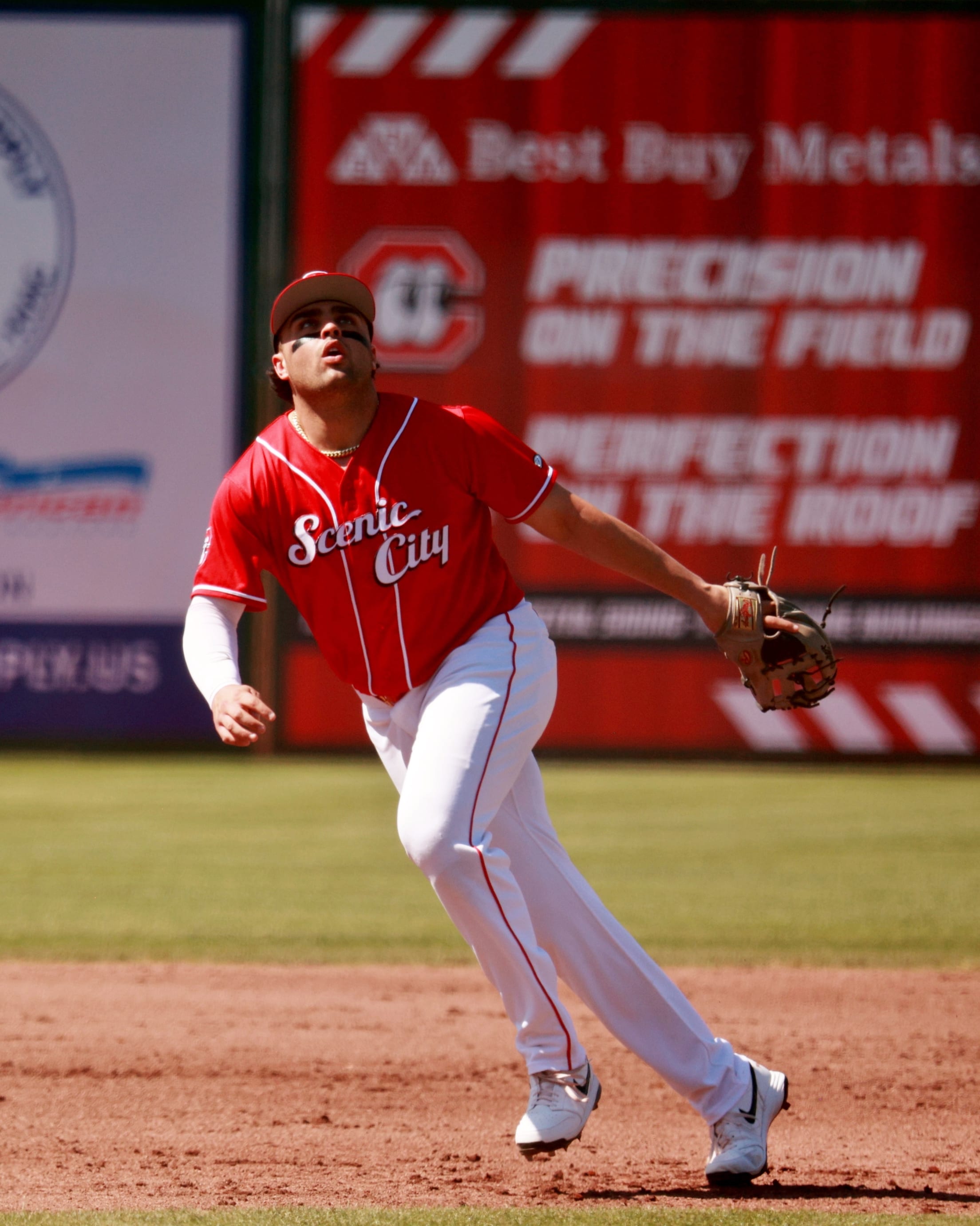
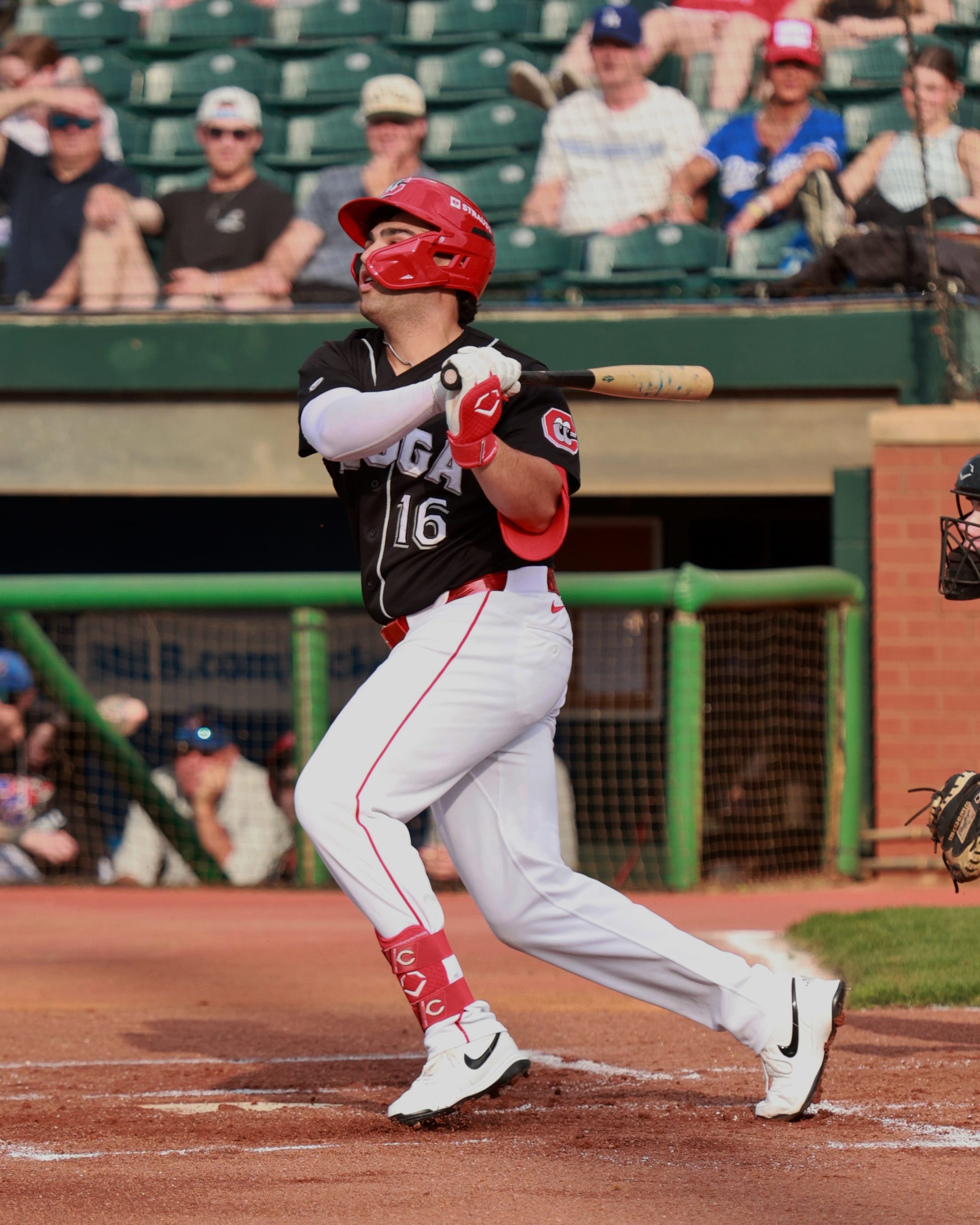
While Chase Burns shined in the minors on the pitching side, Sal Stewart is doing his part in the batter’s box.
Entering 2025 as the Reds’ No. 3 prospect and No. 1 hitting prospect, the 21-year-old has enjoyed his stint with Chattanooga this season.
There’s a certain hitting proficiency that comes with the former 32nd overall selection in 2022, whose .300+ average in each of the season’s first three months speaks to his consistency and nine 3+ hit performances in that span speak to his big-game ability. He was recognized for his first-half efforts with a selection to the All-Star Futures Game
With a bright future ahead for the hitter, he spoke about his game, connection to an MLB superstar and goals for 2025.
Being so high up on the Reds’ prospect rankings, how did you get here? What’s your baseball story and your relationship with the sport?
Since my dad coaches basketball, that was my first sport. My dad was big on me playing a lot of sports, so he also put me in baseball. I really love baseball, so he was like, “You know what? I'm going to keep you in it.” Growing up I always played two sports. Once I got to my senior year, we felt like it was best if I just played baseball. That was the first year I didn’t play two sports. After that, I progressed with baseball and once I signed, I was full go.
How do you deal with the pressures that come along with being the Reds’ No. 3 overall prospect and the No. 1 hitting prospect?
To be honest with you, I don't really look too much into those rankings and stuff. It's great to look back on after the season's over. But, once we get into spring training, the other team doesn't care nor do any of the pitchers. I just go out there and play to the best of my ability. I go out and play hard, keep doing what I'm doing. It’s obviously got me in a good position. Once you step in between the lines, everyone puts their pants on the same way and the pitchers don't care. They're trying to get me out, so I go out there and play the same way I always do no matter what.
After spending 2024 with Dayton, you got promoted to Chattanooga this year. How do you keep pushing for the next call-up?
We have a great group of coaches and a great group of coordinators that continue to make sure I'm playing to the best of my ability, not only outcome related, but just continuing to learn, continuing to perfect my game. That's what the minor leagues are for. You want to perfect your game as much as possible, so whenever you do get that call, you don't have to go back down. You want to stay up there and play and play the way you know how to. So honestly, it all goes to my coaches, my teammates, the coordinators that are always on me. They're making sure that I'm on top of my game and continuing to go about my business. So all the credit goes to them for making sure that I'm on top of it all.
When you started with Chattanooga this season, what did your goals look like?
[My goal is to] make it to the big leagues. That's been my goal since I started in Daytona. No matter where I am, that is my goal. That is my main focus. I want to make sure if my goal is to make the big leagues, I have to do whatever it takes to get there. So, keeping that goal and keeping that main focus allows me to get better every day. My goal was to make the big leagues, even in my first year. It’s even more now. After I finished big league camp and then got into Double-A, I said, “You know what? I feel like I have a chance to go out there and prove to them I'm ready.”
Do you focus on smaller goals while with Chattanooga? Or is every centered around your main goal to make it to the majors?
There are many goals every week, just regarding me getting better and my player development. The main thing is the big leagues. That's been my goal my whole life. Seeing the opening day crowd in Cincinnati, it just fires me up even more. Every time I wake up and go in between the lines, I just pictures that being in Great American Ball Park. That's what fuels me.
You mentioned big league camp a little earlier, which you were able to experience for the first time this year. How was that for you?
I mean it was great just learning from all the big league guys that were there, creating relationships with them, hearing what they have to say, learning about how big leaguers move. It was a great experience all around and it was a big step for me, one step closer to my goal. I'm so happy I was able to do that.
When you look at your own game, what do you think is the strongest part of it?
I feel like I’m versatile. If you need me to hit for power, I can do it. If you need me to hit for average, I can do it. If you need me to get on base, I can do it. If you need me to hit for doubles, I can do it. If you need me to move people over, I can do it. If you need me to play defense, I play defense. I feel like I just do a lot of things well. If you were to ask me one thing, I'd probably say my ability to hit to all parts of the field.
What makes you able to do all of that? In other words, how are you so versatile?
I feel like when I go up to the box, I'm a tough out. I don't give at bats away. I hit the ball hard. I make the pitcher work. I'm able to put the ball in play if I need to. I'm able to hit the ball in the gap if I need to. I'm able to hit the ball out if that's what the game calls for. I feel like in any situation in the game, I can make something happen while I’m in the box.
Your proficiency with hitting is undeniable. What goes through your mind when you’re standing at the plate?
What goes through my mind is the game. When I’m on deck, I'm just looking at the scoreboard and it tells me everything I need to know. “OK, this is the situation we're in.” Then I go from there and make my plan. I use the numbers to my advantage. I watch the game; I use my eyes to my advantage. I allow the scoreboard to dictate what I have to do in the box.
Not a lot of minor league players can boast about having a relationship with a superstar. However, you can. Tell us about your relationship with Manny Machado.
Manny's been awesome in my life. I consider him my family. He's been everything in my life. He's helped me in every way, shape or form, on and off the field. I just have a great group of people around me to help me throughout this whole journey. And not only that, but he’s also more of a friend to me than anything. I'm able to talk to him about anything, we can joke about anything and we can hang out. Honestly, it is way more than just something on the baseball field, it is way bigger than that.
Q&A – Chase Burns
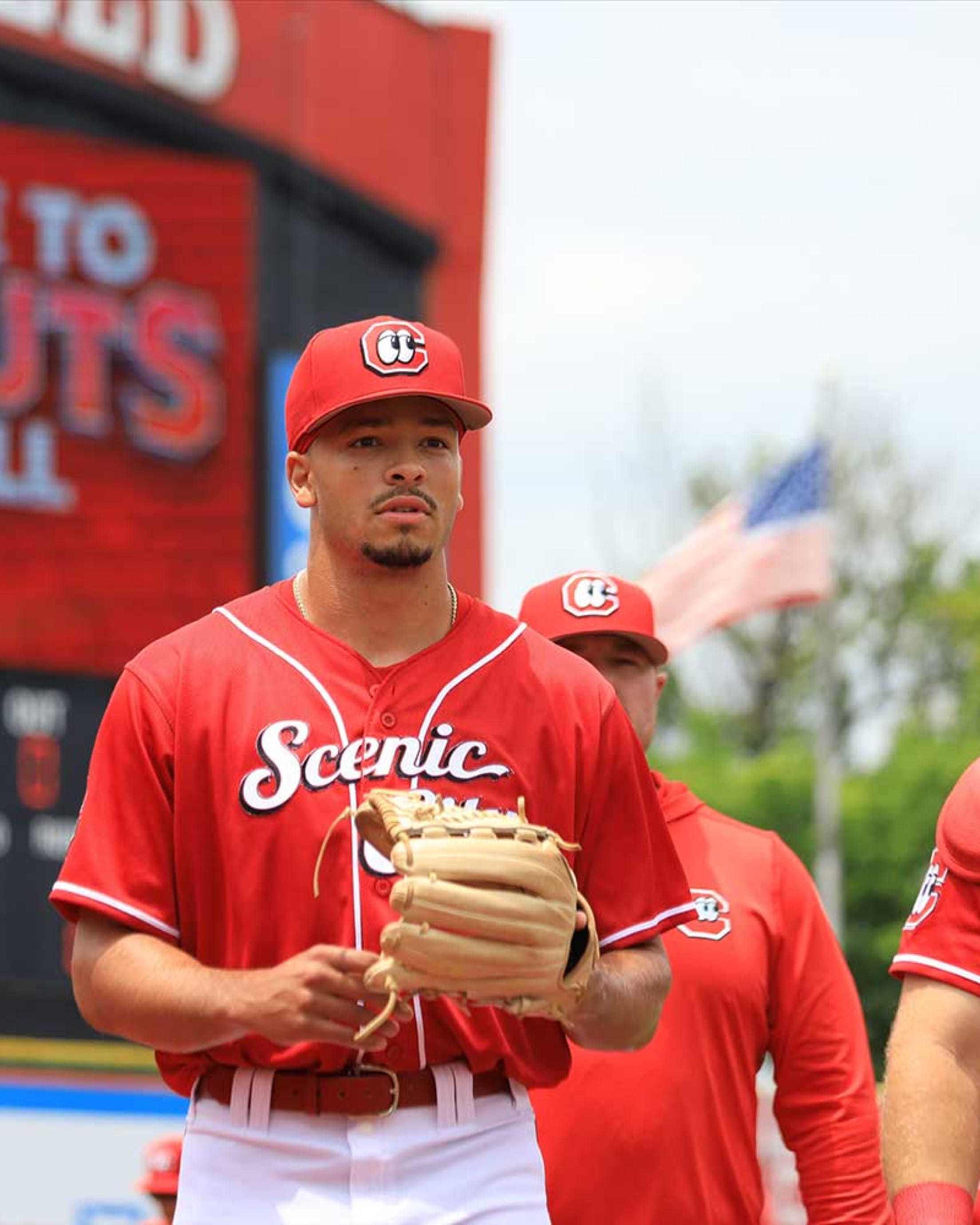
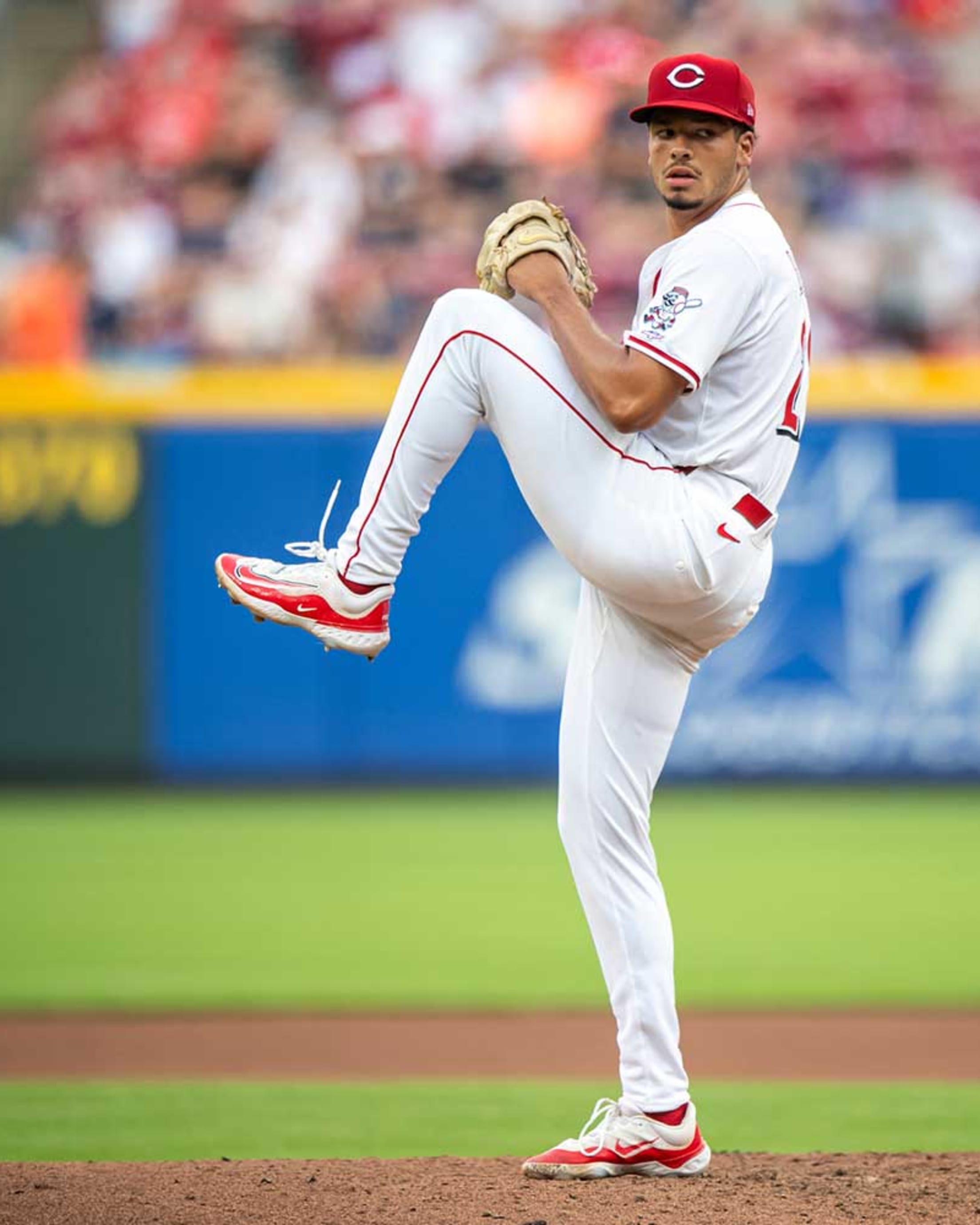
Dayton. Chattanooga. Louisville. Cincinnati. Those destinations are where Reds No. 1 prospect Chase Burns has spent time this year.
The kicker? The MLB’s No. 3 right-handed pitching prospect went through them all in a three-month span during his rapid progression from High-A to the Show.
Since being selected second overall in the 2024 MLB draft, Burns’ first pro season has been a spectacle. After only three starts with the Dayton Dragons, Burns was bumped up to Double-A Chattanooga. Six weeks later, he was pitching for the Louisville Bats where it only took two starts for the 22-year-old to pick up his first Triple-A win.
On June 24, after putting together a 7-3 record with a 1.77 ERA and 89 strikeouts in 13 minor league games, he received the call-up and made his MLB debut against the Yankees. An electric night featured Burns striking out the first five batters he faced, the first starting pitcher to do so in his debut since at least 1961 (start of the Expansion Era).
Just before his promotion to the majors, Burns reflected on his relationship with baseball, his successful 2025 season and what comes next.
Where does your relationship with baseball stem from? How did that relationship evolve?
I've had huge ups and downs with the game. Starting off when I was young, I wasn't always the biggest or the best. I didn't even think I would play college baseball. But as I developed, God blessed me with the ability, and it was a lot of hard work. There were a lot of people supporting me. My dad was my biggest supporter helping me through my baseball journey. So just growing with the game has been fun to see the process. My dad and I were talking the other day, it's crazy to think that I didn't even want to play baseball when I was a freshman in high school and now, I'm 22 in Triple-A. It's really cool to see what God can do and the opportunities he can put you in. Being one step away from the big-league level is really cool. All the glory goes to God, and I can't wait to see what the future holds for me in my career.
What’s it like being a former second-overall pick and the Reds’ No. 1 prospect. Is there any pressure or stress associated with it?
For me, I don't really see any pressure in it, but anything you do in life, you're going to have pressure anyways. I don't really look at the rankings and stuff like that, but it is a huge opportunity for the Reds to value me as the number one prospect. But then again, you still must go out there and play baseball and still perform. So that's kind of my mindset on it, just going out there and playing the game and trying to get better every day
After starting with High-A Dayton in April, you’ve progressed through the pipeline quickly by spending time in Chattanooga and now in Louisville. What is that experience like?
It can be a lot, especially for my first full pro season, I didn't really expect to move up that quickly from Dayton to Chattanooga, but it was a great opportunity to get closer to family. But it's a little hard. You get comfortable at a spot; you get close to a lot of teammates and then you end up just getting up and leaving. It’s something that I've had to deal with, but then again, it's still cool to be able to play for different teams and move on up and get close to the big leagues.
Spending time with three different clubs probably opens you up to a lot of learning experiences. Tell us about those lessons.
I've taken a lot away from it. At every level you see something a little bit different, whether it's the pitching on the other side or the hitters. Seeing how my own teammates go about their process [is interesting] also. As you get higher up into Double-A and Triple-A, you do see that these guys take their process very seriously and they're at the spot that they're at because of how they go about their business. It’s really cool to see that.
When you opened your season with Dayton, what did your goals for the year look like? As you’ve progressed, have those changed? If so, how?
When I was in Dayton, I was just trying to get my feet wet. It was my first time being at the baseball field every day coming out of spring training. I was just getting into a good routine with everything that could help me perform better on the field. I felt like I got that done in Dayton and when I went to Chattanooga, it was more like, “Let's work on the pitching side of it. What are these hitters looking for? What can I improve on?” The biggest thing for me [to improve on] is my changeup. I've always been a four-pitch mix guy, but I haven't really had to use the changeup. As I'm moving up on these levels, being able to attack the lefties with something different, I feel like it's a huge piece for me.
You’ve put together impressive starts at all levels you’ve played thus far. Where does that come from? What do you credit for all the good stats and even better outings?
It’s the people around me. The coaches and my catcher, of course. Then it’s also just my routine. Just you can't stay on an outing for too long knowing that you must play a couple days later. So, having that short memory of, “OK, what did I do good, what did I do bad?” Then it's time to recover and get ready for the next start.
How does your routine between starts compare to the morning before a game with you on the mound?
It's a lot of working out, getting the arm care in after and stretching. I take my routine very seriously. It's a long season. I'm already up to maybe 80 innings now. In college, you max out at a hundred. So, being able to have that routine that you can stick to and have that longevity of your arm, and your body is huge. [For the morning of, it’s] waking up, getting the mind and body right, fueling yourself and getting hydrated. Mentally, you're getting prepared to go out there for seven innings. That's the goal every time. It’s just getting ready for war. It’s a long day of trusting yourself and just going out there and attacking hitters.
You and Reds No. 2 prospect Rhett Lowder are both products of Wake Forest. What does that mean for your guys’ relationship?
I met Rhett when I committed to Wake Forest, and he was there in the offseason. I got to spend some time with him and talk to him. Then, this spring training, we actually got a place together. I spent a lot of time with him picking his brain and getting closer to him. He's been one of the first people to text me and tell me congratulations for moving up. I've been texting him, seeing where he's at in his process. It's really cool having an older guy that's in your corner supporting you and vice versa.
This year’s spring training was your first big league camp. What was that like for you?
It was really cool. There were a lot of emotions going into it. I was super nervous, of course, being around a bunch of big leaguers. At the same time, I knew that I could learn a lot from guys like Rhett and even Chase Petty. Him and I have gotten closer as we're starting to play together. I just learned a lot and got to see how big leaguers go about their day, what they're thinking about and how they recover. I only had one outing at the big-league level, but it was a cool moment to go out there and perform.
You’ve mentioned that you’re excited about your future. How do you keep pushing and progressing for it?
It's hard, but at the same time, like I said, God's given me an opportunity, and I wouldn't want it to go to waste. I know a bunch of people that would want to be in the spot that I'm at. So just going day by day. And then again, it's something that I love to do. There are not many things that I would want to be doing as my profession, but to say that I play professional baseball is just a dream come true.
Q&A - Cam Collier
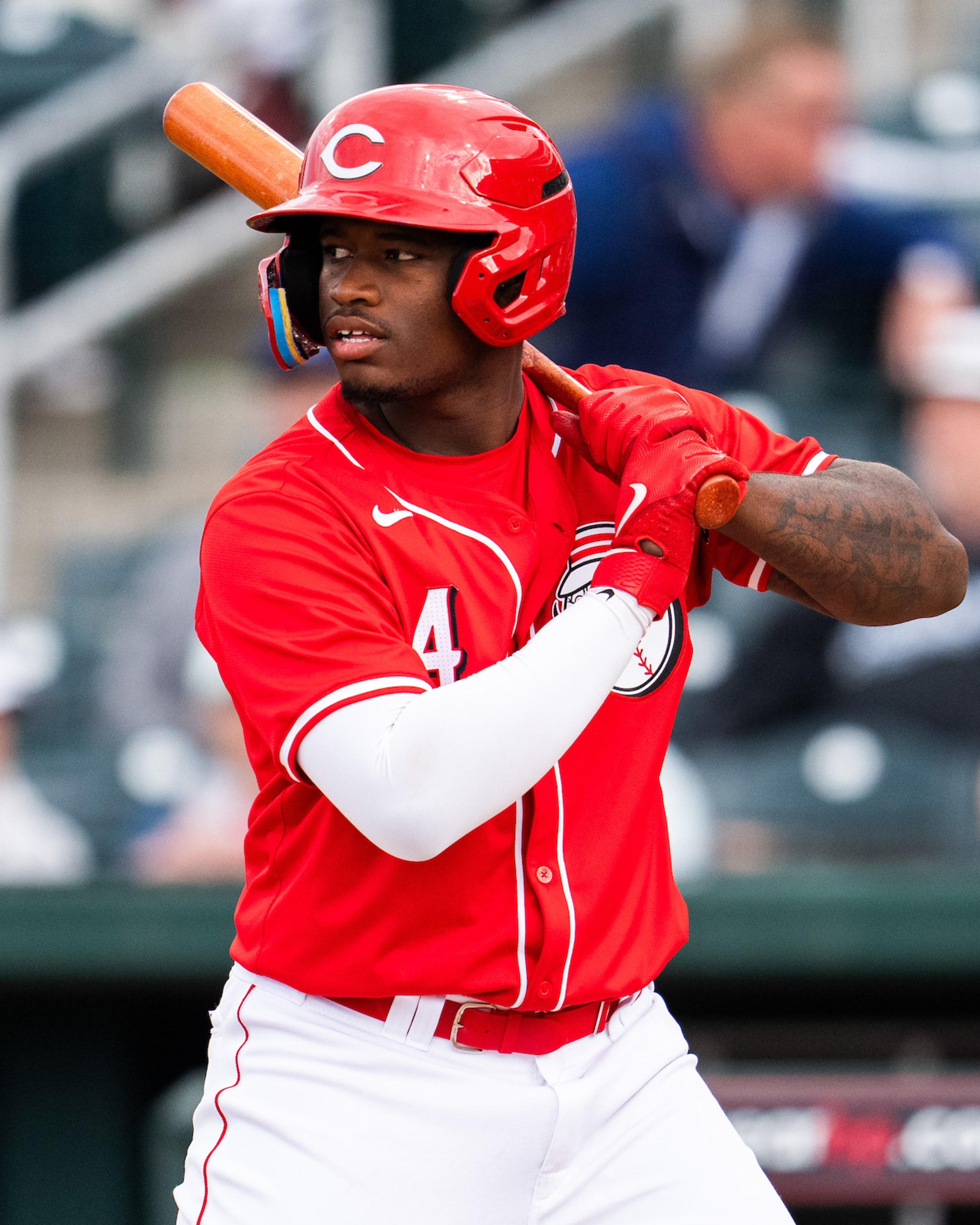
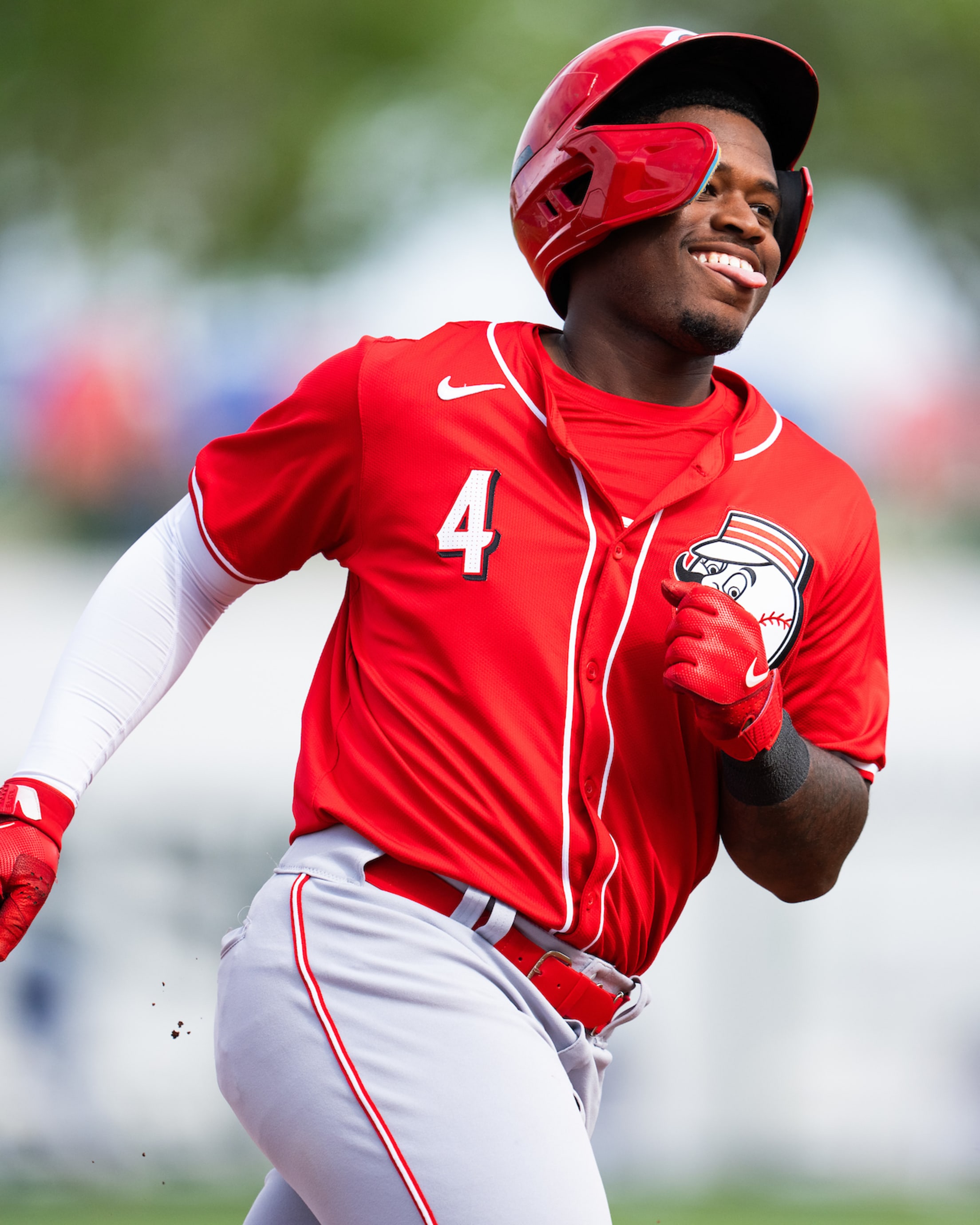
In January, while in Cincinnati for the Reds Caravan, one of the organization’s top prospects Cam Collier was recognized as the 2024 Reds Minor League Position Player of the Year.
Collier spent the 2024 season in High-A with Dayton, helping lead the Dragons to the playoffs. He was the team leader in home runs, RBIs, runs scored and walks, and his 74 RBIs and 72 runs led all Reds minor leaguers. He was a 2024 Midwest League All-Star and became the second Reds farmhand to win the Larry Doby Award for Most Valuable Player at the All-Star Futures Game.
While on the Caravan, Collier spoke about the 2024 season and his expectations heading into 2025.
How did you feel when finding out you won the Reds Minor League Position Player of the Year Award?
Winning it, especially after having the year I had before where I was struggling, being able to bounce back this year and have the success I did, it was really a blessing. To see that hard work pay off after that struggle, it was amazing.
What was the biggest change in your game last year?
It was really the mindset that I took into the offseason. I went into the offseason with a chip on my shoulder and put 100 times more effort into my work. And even when I got into the season, I was still going hard with my work and actually going with a plan and sticking with it. Yalking with my coaches more and trying to get some help instead of just trying to do everything on my own. Trusting the people around me. And I saw the change. Even when I did struggle, I was able to work out of it and work through it.
And those changes you talk about, what was the biggest thing that you stuck with that you hadn't done previously?
Some different things. My dad was telling me, ‘Hey, you have to get some sleep. Then you have to wake up, eat some good food.’ And then asking our hitting guys, ‘What do you think about my hands?’ So then we go over it, and we look over videos to go over my hands. We're going over what I’m doing good. Just looking at little things like that and then putting that into drills and working on it.
We saw your power early and often last season. A lot of players say they don’t try to hit home runs and it just happens when they put good swings on the ball. Was this the case for you, or was it something you consciously sought to tap into last season?
I went into the offseason knowing that I had all this power that was going unused, and I wanted to figure out how to generate it, but without forcing it, where I could still hit but generate power as well. And I just worked really heavy into that. Worked out my body. Worked out some explosive stuff. And it translated this year. I didn't know it was going to translate that much, but it did.
That power was on display in a big way at the All-Star Futures Game, the biggest stage at your level of the game, where you hit a home run and won the MVP award. Not that you needed it, but how did that validation feel in such a big game?
It was amazing. You know, I was telling my dad before the year that the Futures Game is something I've always wanted to make. I've always wanted to play to in the Futures game. I watch it every year. And to go and win the MVP of it was something crazy.
Your Dragons team that made the playoffs was stacked on offense with yourself and guys like Sal Stewart, Hector Rodriguez and Ethan O’Donnell, among others. Knowing that you are all kind of in the same group coming up together, how exciting is it knowing that you could potentially be that next wave to help steer the future direction of the franchise if you all stick together?
Yeah man, it's a good group of guys to be around. So it's a really good thing to look forward to because I know that we have it in us. We know that this group of guys can help the big league team win in the future. And, especially like you said, Sal, Ethan, Hector, we took off this year and being able to all play together and learn how to win together is pretty cool.
Does your mindset change at all after getting the invite to Major League spring training camp?
You really can't change because if you change too much, you might go in there a little nervous. But I just take it as a challenge. I'm looking forward to it. It's a blessing. You know, they feel like I'm ready to compete in the big league spring training, and I'm excited. I'm excited to be around the big league team for the first time and be able to practice with them head-to-head and get to play with them. And I'm excited getting to be around Coach Francona a little bit more.
Some players set individual goals going into each season, while others don't like setting those types of goals in fear of getting caught up in the chase to reach them. Where do you fall on that spectrum?
What I've always done is I've set such crazy goals to the point where if I even get close to them, it's awesome. And even if I don't get close to them, it's still going to be good. Like I might say, let me get 170 RBIs. And if I get 80 RBIs, that's pretty good. I like to set goals like that. That's what drives me. At the beginning of the year, I always have my book and I'll write my goals down, and then I’ll just check one off, check another one off. And I always play better when I have something I'm looking forward to or something I'm reaching toward.
The Reds drafted you in 2022 when you were 17 years old, so you’ve been here for quite awhile, yet you're still only 20. And then you have some guys coming in from the 2024 draft who are 22 or 23. You're still younger than they are, but you've had experience in pro ball now for almost three years, so what's that dynamic like when you have these new guys coming in and you’re still the young guy?
It's funny because two of my buddies got drafted last year and they're 23. And they're like, ‘Hey Cam, you're uncle, you're unc.’ And I'm like, we're basically the same age, you’re actually older. So it's kind of crazy. Those guys are in their first year, I'm younger than them or we're the same age, so it's really different. I feel older, like I've been playing forever, but when you really look at it, I'm not even 21. So I just make fun of them for being old.